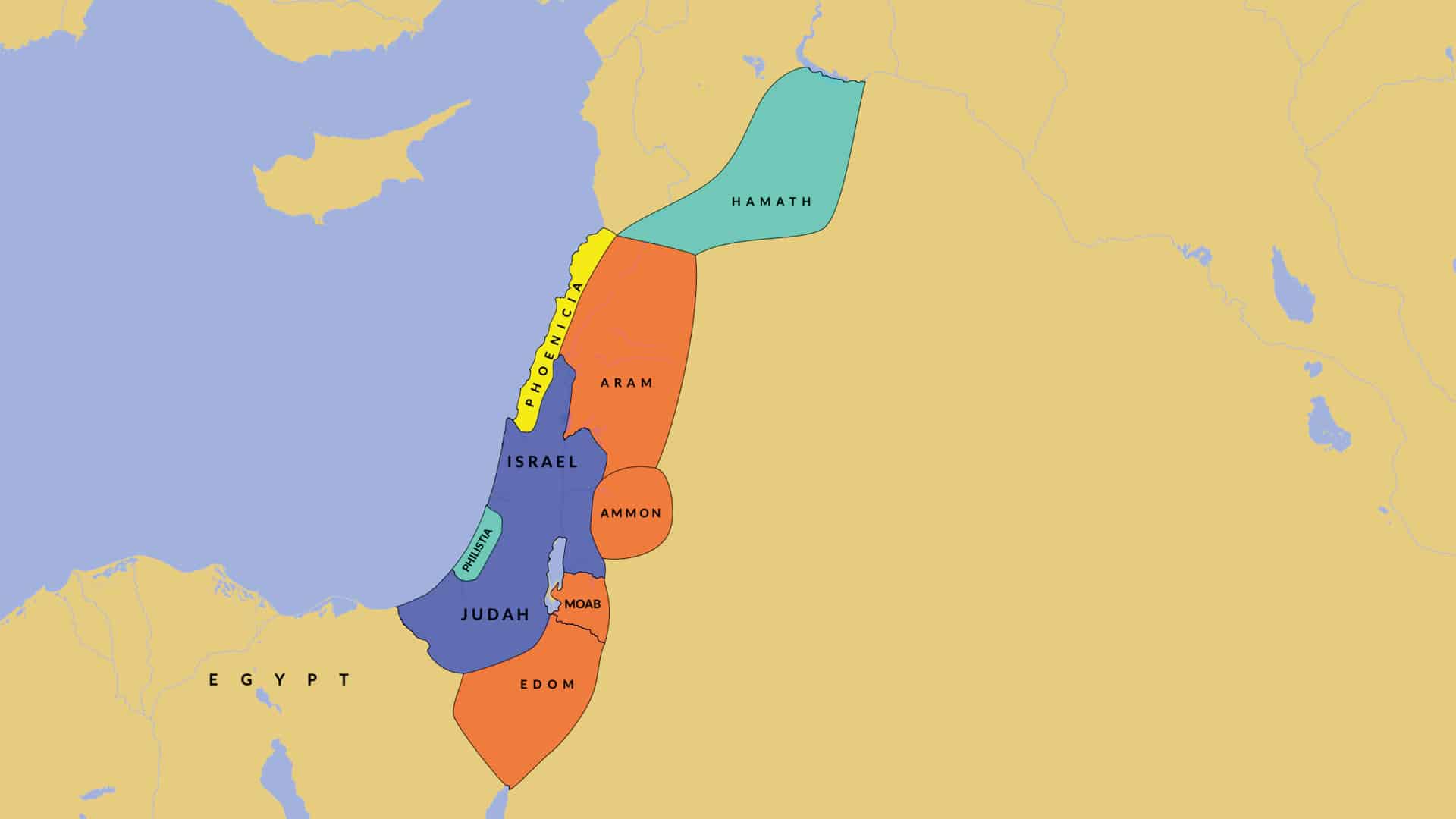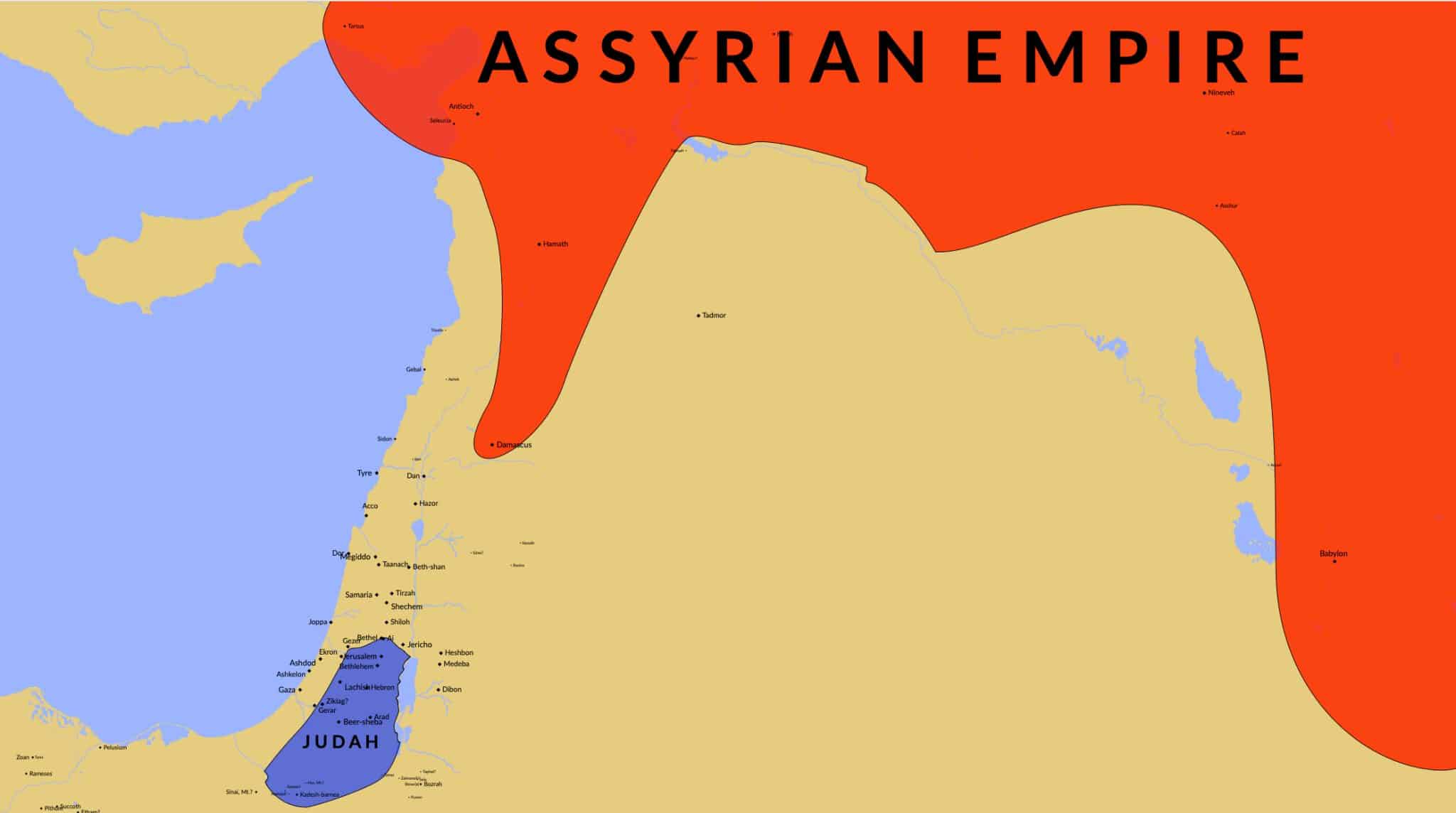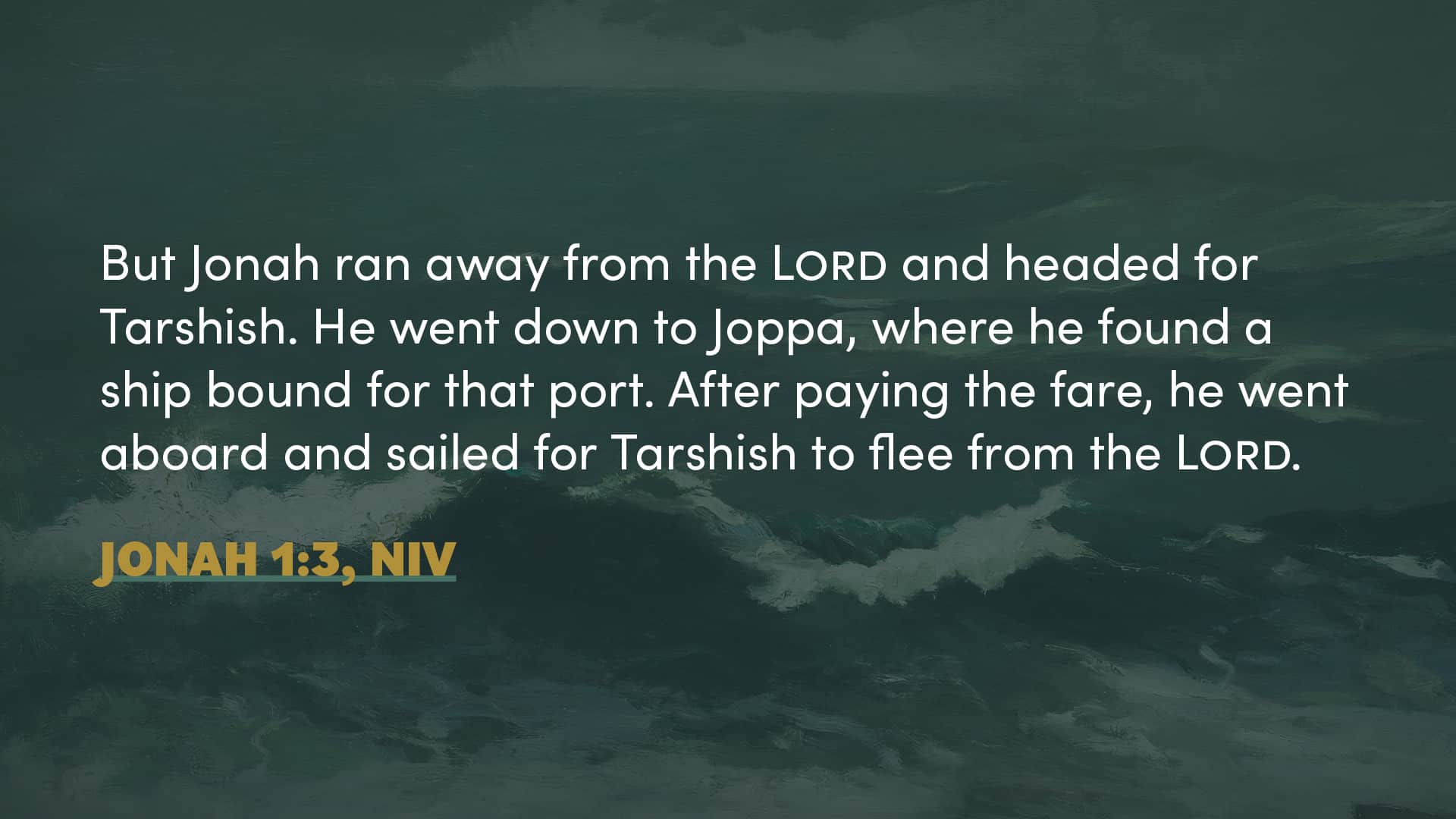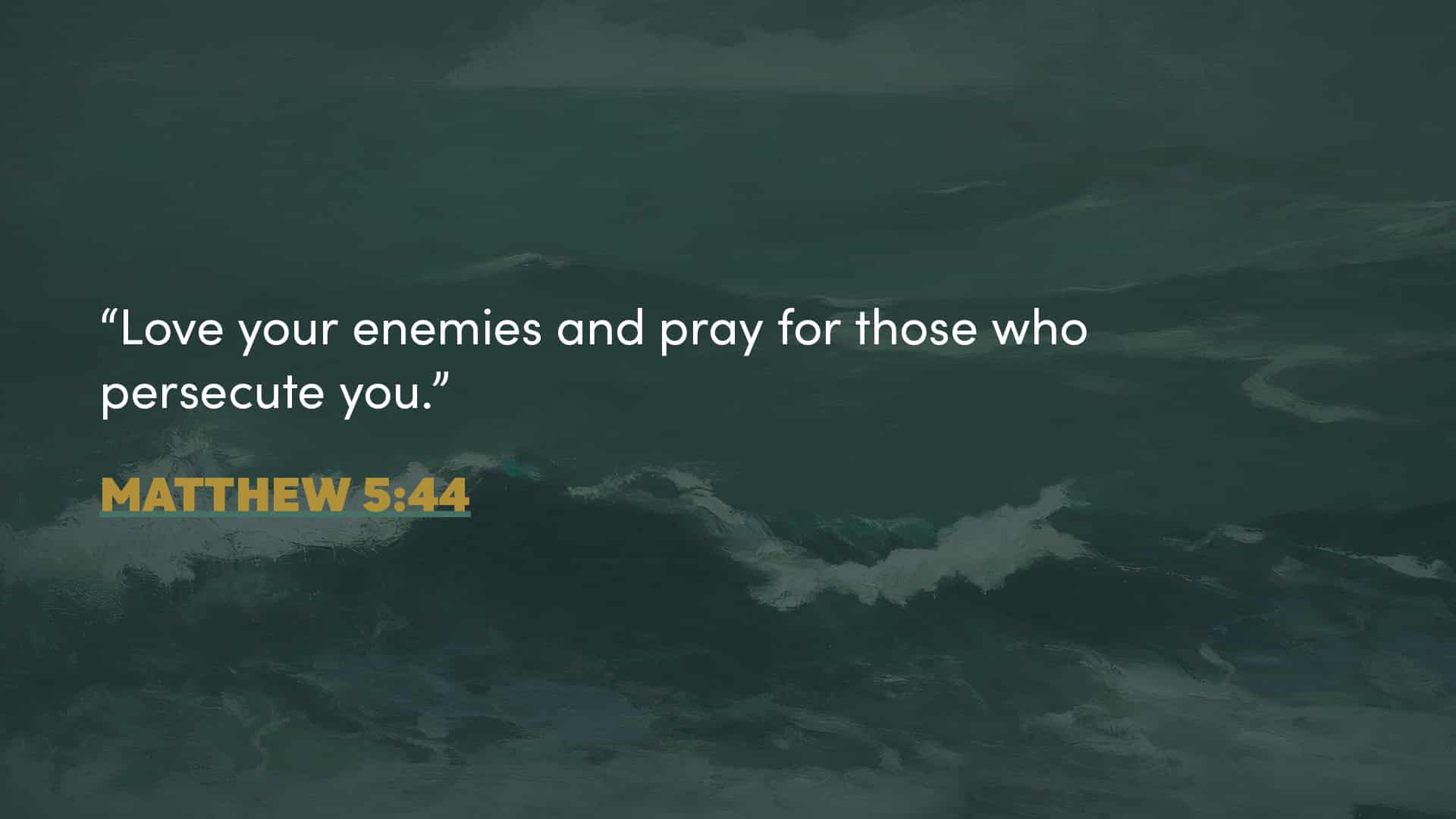Read this adapted message on Jonah 1 about God’s heart for the nations, and how he invites us into it.
In grad school, I translated the book of Jonah. I thought I understood it fairly well, but it is incredibly deep — pun intended. In teaching it, you could say I feel like … a fish out of water.
But seriously now: This is an incredibly rich text.
God has a message for the church through Jonah, which is why this is part of the Bible, his inspired Word.
As you read the text with me now, ask the Lord, “God, what do you have for me to hear?”
Jonah 1 (NIV)
The word of the Lord came to Jonah son of Amittai: “Go to the great city of Nineveh and preach against it, because its wickedness has come up before me.”
But Jonah ran away from the Lord and headed for Tarshish. He went down to Joppa, where he found a ship bound for that port. After paying the fare, he went aboard and sailed for Tarshish to flee from the Lord.
Then the Lord sent a great wind on the sea, and such a violent storm arose that the ship threatened to break up. All the sailors were afraid and each cried out to his own god. And they threw the cargo into the sea to lighten the ship.
But Jonah had gone below deck, where he lay down and fell into a deep sleep. The captain went to him and said, “How can you sleep? Get up and call on your god! Maybe he will take notice of us so that we will not perish.”
Then the sailors said to each other, “Come, let us cast lots to find out who is responsible for this calamity.” They cast lots and the lot fell on Jonah. So they asked him, “Tell us, who is responsible for making all this trouble for us? What kind of work do you do? Where do you come from? What is your country? From what people are you?”
He answered, “I am a Hebrew and I worship the Lord, the God of heaven, who made the sea and the dry land.”
This terrified them and they asked, “What have you done?” (They knew he was running away from the Lord, because he had already told them so.)
The sea was getting rougher and rougher. So they asked him, “What should we do to you to make the sea calm down for us?”
“Pick me up and throw me into the sea,” he replied, “and it will become calm. I know that it is my fault that this great storm has come upon you.”
Instead, the men did their best to row back to land. But they could not, for the sea grew even wilder than before. Then they cried out to the Lord, “Please, Lord, do not let us die for taking this man’s life. Do not hold us accountable for killing an innocent man, for you, Lord, have done as you pleased.” Then they took Jonah and threw him overboard, and the raging sea grew calm. At this the men greatly feared the Lord, and they offered a sacrifice to the Lord and made vows to him.
Now the Lord provided a huge fish to swallow Jonah, and Jonah was in the belly of the fish three days and three nights.
Who Is Jonah?
Jonah 1:1: “The word of the Lord came to Jonah son of Amittai.”
Who is this guy?
If you have watched any Bible-focused cartoons, you’ve probably come across a kids’ version of the story of Jonah. If you’re honest, you might have asked yourself, “Did this really happen?” For those of you who secretly wonder whether Jonah was a real person, I offer three proofs.
- Jesus considered Jonah to be historical.
- The phrase, “The word of the Lord came to …” is used eighty-five times in the Old Testament, and every time it is spoken about a historical person.
- Jonah is mentioned in 2 Kings 14:25: “… in accordance with the word of the Lord, the God of Israel, spoken through his servant Jonah son of Amittai, the prophet from Gath Hepher.”
For some background on the 2 Kings passage, at that time the 12 tribes of God’s people had been divided into two kingdoms: The 2 tribes in the south were called Judah and the 10 in the north were called Israel. Israel’s capital at the time was Samaria, and Jeroboam II became the king of the northern ten tribes.
Verse 25 says Jeroboam II was the one “who restored the boundaries of Israel from Lebo Hamath,” which is about 45 miles north of Damascus, southward “to the Dead Sea.” He did this “in accordance with the word of the Lord, the God of Israel” — now this is where it comes to Jonah — “spoken through his servant Jonah son of Amittai, the prophet from Gath Hepher.”
Jonah had a great ministry of prophecy.
And he was best known for the expansion of Israel to the north, carried out by Jeroboam.

At the time when Israel and Judah were one kingdom, there was an area to the north called Aram. Jeroboam II basically led a campaign to take this back — ground that they had lost since the time of Solomon’s reign. When Jeroboam took the throne, they reclaimed that area north of Israel.
Israel was able to do this because the Arameans were distracted fighting the mighty Assyrian Empire — their enemy to the north and northeast. There was so much warfare between those two countries that when Israel invaded, Aram couldn’t fight back, and Assyria was too worn out to bother with them.
So for a period of time during Jeroboam II’s reign, Israel had this massive territory gain without a threat. This was around 750 BC — that’s important because of what happens next. But first, a little bit of background about Nineveh.
Who Were the Ninevites?
In Jonah 1:2, God said, “Go to the great city of Nineveh and preach against it, because its wickedness has come up before me.” Now, Nineveh (modern-day Mosul, Iraq) was a military outpost of the Assyrian Empire; they actually ended up taking over Israel in 722 BC, carrying the 10 northern tribes into captivity.

At the time of Jonah’s story, this had not yet happened. But everyone in Israel knew that Assyria was the big dog in town.
No one messes with Assyria!
They were awful, vile, horrendous people. We’ll get to some of their actual vile acts later in the series. But for now, just know that they were a terrible enemy of the people of God, feared for hundreds of years before Jonah’s ministry.
Running From God’s Heart
God told Jonah to go to Nineveh and “preach against it because its wickedness has come up before me.”
But here’s the problem: Jonah’s whole ministry was opposed to these people! Remember 2 Kings 14:25? He was the guy who said that Jeroboam II in Israel would take back the land! He had to be thinking, “Hey, my whole ministry, my whole campaign as prophet — the whole reason people in Israel know me — is about my being the guy who said we’d take this ground. And now you’re calling me to the people who could take it back? No, no, no!”

If you’re a fan of The Office, this is the moment where Toby comes back to the office and Michael says, “Nooooo!” Worst nightmare situation for him.
Or if you’re a Home Alone fan, picture Kevin’s face on that iconic poster: hands on cheeks, mouth forming a big “Aaaggh!”

In Jonah’s case, God’s directive was literally the last thing that he wanted to hear.
“But Jonah ran away from the Lord and headed for Tarshish,” even though he knew better than that.
Verse 3 continues, “He went down to Joppa where he found a ship bound for that port,” the port of Tarshish. “After paying the fare, he went aboard and sailed for Tarshish to flee from the Lord.

The original Hebrew indicates that Jonah paid her fare, meaning the ship’s fare. It’s possible that he bought that whole ship.
Disobedience can be expensive!
Now Tarshish, far to the west of Israel, was in the complete opposite direction of Nineveh, which was to the northeast. Jonah first went down to Joppa from Jerusalem, which is 2,500 ft. above sea level. Then he bounded a ship headed for Tarshish, which was quite a distance across the Mediterranean.
Scholars debate the location of Tarshish, but assuming it was Tartesus — which may be modern-day Seville, Spain — it would have taken Jonah three years to go there and return.
Jonah was planning on long disobedience in the wrong direction.
Eugene Peterson would not approve.
Isaiah 66:19 gives us some insight into how this prophet of God might have masked his disobedience as spirituality. Through the prophet Isaiah, God said, “I will set a sign among them, and I will send some of those who survive to the nations—to Tarshish, to the Libyans and Lydians (famous as archers), to Tubal and Greece, and to the distant islands that have not heard of my fame or seen my glory. They will proclaim my glory among the nations.”
Jonah, likely aware of this prophecy, said “Sign me up for the mission of Tarshish!” Even though God had called him to Nineveh.
Tarshish was on God’s list of nations to reach; just not yet.
Can I ask you a question: Do you mask your disobedience with spirituality?
Jonah decided that he would obey God, but in his own way. And as we’ll come to see, it didn’t quite work out for him.
Does this approach work out well for you? Me neither.
Running from God is never a good choice.
But we do it, even when we know better. I think Jonah had every reason to run from God — humanly speaking. His whole ministry was predicated upon the fact that “those people” needed to stay separate from “our people.” He was what some might call a hyper-nationalist. He had displaced his identity, and God took second seat. God received the leftovers of what Jonah thought his ministry was supposed to be.
Who Is Your Enemy?
As you think about what God might be calling you to, consider this question: Who is your enemy?
Christians today can rightfully declare that those who attack the church are enemies of God and his church. It’s important that we guard our families, that we guard our churches, that we shepherd the church. This involves identifying who the enemy is and what the enemy might be doing, but also having heart of God for the enemy.
The very people who we consider truly vile and wicked and despicable — the kinds of people we don’t want to be around — those are the people that God loves and calls his people to go to — that he called Jonah to go to.
But what did Jonah do? He fled.
Extending God’s Mercy to Our Enemies
Let me ask you a question:

What is God’s heart toward them?
There’s a story that Tim Keller shares in his book Rediscovering Jonah (page 151):
Back in 2006 a lone gunman went into an Amish schoolhouse and took hostage 10 girls, ages 6 to 13, five of whom lost their life; he then committed suicide. At the time, the Amish community’s response towards this gunman shocked everybody.
Sociologists took notice, saying that modern American society can no longer produce people capable of that kind of response. But this Amish community did. In fact, the people who lost their daughters showed up to the gunman’s funeral to express their love towards his family.
They actually forgave the gunman explicitly and publicly blew everyone away.
The sociologists argued that America is now a culture of self-assertion, in which all people are encouraged to express themselves and assert their rights. The Amish Christian community, by contrast, had created a culture of self-renunciation, patterned after Jesus’ self-sacrifice: renouncing their rights in the service of others.
Jesus said, “Love your enemies and pray for those who persecute you” (Matthew 5:44).

How do we pray for people that are that terrible, truly wicked, in our campaign against evil?
We can’t forget that those who have been deceived into participating in evil are real people, made in the image of God. And if we’re not careful, we’ll play their game; we’ll watch the puppet show and act like it’s reality when, in truth, God has a heart for the lost.
Part of our challenge is that we can be blind to God’s heart because we have judgment. We’re right to judge sin. But we can mask our judgment with spirituality when instead:
God wants to show us his heart for the sinner.
Jonah obeys God’s heart for the nations, but in his own way. Today’s equivalent might be God calling you to minister to Muslims in downtown Nashville, and you responding, “OK, I’ll go to Africa on a short-term trip.”
Or perhaps God calling you to minister to the LGBT community, not to condone their lifestyle, but to patiently, humbly preach repentance by following God’s spirit. But instead, you decide to simply pray regularly for that community. It may look like you’re following God’s heart, but it’s on your own terms, in your own ways, in your own timing.
Will You Go?
“Go, get up, do something.”
That’s God’s call to Jonah, and that’s God’s call to us. The church is to actually go and preach the Word by God’s Spirit.
If God asked you to go, could you even hear it?
God have mercy on us when we disobey and we don’t even hear it. God give us grace to hear you afresh! God help us to remember who the real enemy is, because the real enemy is not the people!
They are puppets being played by our great enemy, the evil one. And if we can remember that, we won’t play their games or give into their tactics. We know how it works. We know who wins the battle.

Assyria does end up taking the people of God captive, but that’s not the end of the story. It’s not about this nation versus that nation, this people group versus that people group. Jonah, in all his of his spiritual ministry, had remained so focused on his own nation that he had forgotten God’s heart for other nations.
So what do we do with these challenges?
We open our eyes to God’s heart and ask him, “God, would you enlighten the eyes of my heart to beat with your heart?” We take off the mask of our spiritual externalities. We ask, “What are you actually saying to me, God? What are you saying to us as a church?”
And we remember that:
Even though it’s good to draw a line in the sand to define the enemy, God can call us to step over enemy lines.
It’s hard to follow God’s heart into the nations. It’s hard to follow God’s heart behind enemy lines. But, when we obey, we find Jesus is already there.
Running From God
Running from God will not go well for us. It did not go well for Jonah — he created a storm. He’s the most dramatic prophet out there; we’ll see that as we get into chapters three and four.
What happened to Jonah can happen to us. Jonah rejected God’s call, but God still wanted Jonah to do his work. He pursued Jonah; he chased after him with fierceness and with love. Jonah found himself in a deep, deep mess, covered in seaweed and all sorts of stuff.
But God appointed a big fish to take him out of the deep and to show him a new way, not only for himself but also for the nations, even for the villains — the vile, the truly wicked.
I will ask you again: Who is your enemy? To whom is God calling you? Are you willing to hear it, if he speaks a word to you? What if that word is about a particular people whom you happen to find personally offensive, wicked, vile, evil, despicable?
Maybe your enemy it is closer to home than you think. Jonah had a lot to learn, and so do we. Are you willing to hear God’s’ invitation and to obey it?
Pray with me:
God, what is your heart for the lost? For those whom we consider enemies of the faith, enemies of God, the people whom we’ve rejected that we’ve said we don’t even want to be around? Who is it? Would you have mercy and give us grace?
If you’ve held prejudices in your heart, if you’ve held complete judgment with no compassion, total antagonism with no love, all severity and no mercy towards those who are the enemies of the faith — lay those down now.
Lay down your own brokenness from the storms of life. Sometimes the storms come because we’re sinners, but sometimes we’re like the sailors and we’re just caught in someone else’s storm. “God, would you save us? We want to follow you; we want to go where you send us!”
Subscribe to HIM Publications here to get long-form discipleship content delivered to your inbox each week.
